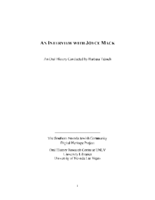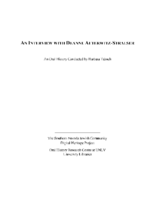Search the Special Collections and Archives Portal
Search Results

José Eliqué oral history interview: transcript
Date
Archival Collection
Description
Oral history interview with José Eliqué conducted by Barbara Tabach on January 17, 2018 for the Remembering 1 October Oral History Project. In this interview, José Eliqué discusses his responsibilities as the Associate Vice President and Chief of Police for the Department of Police Services at the University of Nevada, Las Vegas (UNLV). He talks about the Police Services Department and its mission to maintain a safe environment on campus. Eliqué discusses the night of the October 1, 2017 shooting and the procedures in place that helped the police officers and detectives support the survivors who made their way to the UNLV campus. He also provides details about using the Thomas & Mack Center as a place of refuge for survivors. In addition to his work in Las Vegas, which started when he moved to the city in 2000, Eliqué discusses his service in the US Navy and his career history in New York City and Chicago, Illinois.
Text

Transcript of interview with Elaine Cali McNamara by Claytee White and Stefani Evans, October 5, 2016
Date
Archival Collection
Description
This ability to greet each day with a challenge has laid the foundation for a long history of success for Elaine McNamara as she has navigated through local beauty pageants, an illustrious real estate career, serving on the Las Vegas-Clark County Library board during their decade of expansion to authorship. Her story of resilience starts when she became ill at approximately seven or eight with erythema nodosum that impeded her ability to walk for five months when she started collecting pictures of movie stars. Her favorite movies were any of Roy Rogers, Abbott and Costello, Dean Martin and Jerry Lewis. Her family moved to Las Vegas, where she attended Las Vegas High School as well as UNLV majoring in elementary education and minoring in language arts. While she attended high school, she studied modeling in the evenings to help overcome her shyness and to become more outgoing. Becoming more involved with local and state beauty pageants, she met the likes of Phyllis Diller, Natalie Wood,
Text

Charles Guy interview, 1995: transcript
Date
Archival Collection
Description
Guy begins by talking about his birth in Brazil, Indiana, his early work selling Civilian Conservation Corps magazine subscriptions, and his travels across the United States before arriving in Boulder City, Nevada in 1938. Next, Guy recalls his early memories of Boulder City, the Las Vegas Wash, and his work at the Boulder Beach campgrounds at Lake Mead Recreation Area and in Overton, Nevada. Guy also discusses the campgrounds' working conditions, entertainment, access to amenities, and work associates. Afterwards, Guy talks about his time as a railroad worker in Indiana and Las Vegas, Nevada, Block 16 in Las Vegas, Las Vegas entertainers, working as a volunteer fire fighter, and anecdotes about people in his personal life.
Text

Transcript of interview with Mahamed Youssouf by Barbara Tabach, August 6, 2013 & August 13, 2013
Date
Archival Collection
Description
Ethiopian business owner Mahamed Youssouf became an American citizen in 1986. Born in Harar, Ethiopia, he recalls the hardships he had to endure during the Ethiopia-Somalia conflict. Coming from a family of tailors, he began making clothes with his father at a very early age. Mahamed’s recollections concerning his journey from political refugee to successful businessman demonstrates his resilience and determination to overcome obstacles and achieve his goals. Mahamed moved to Las Vegas, Nevada in 1985, where he rented a storefront in North Las Vegas. The name of his store was Uniform Plus and he focused mainly on making children’s clothes. His efforts proved lucrative as he began buying wholesale in Los Angeles, California, and selling clothes in Las Vegas on the weekends at the outdoor Swap Meet. After a fateful encounter, Mahamed became business partners with Eugene Hoffman, owner of Village East Cleaners. Mahamed firmly believes that communication is the key to socio-economic success. He views education as an investment and states that, “to have dialogue means better relationships.” When the Ethiopian government was overthrown, Mahamed returned home to Africa for a visit. He met his wife while there, got married, and started a family. Mahamed returned to America and bought a family home in Las Vegas. He dedicated his time to teaching his American born children more about Ethiopian culture and taught himself more about American culture— including the African-American experience in Las Vegas, racism, the Moulin Rouge, and the Westside.
Text

Transcript of interview with Willie Jones, James Jones, and Jamet Jones by Robbin Mc Laurin, March 5, 1980
Date
Archival Collection
Description
On March 5, 1980, collector Robbin McLaurin interviews three members of the Jones family, Willie, James, and Jamet Jones (born 1923, 1920, and 1961, respectively) in the Jones home. Mr. and Mrs. Jones were born in Forest, Mississippi, and relocated to Las Vegas, Nevada, for employment related purposes. This interview covers Las Vegas, past and present.
Text

Transcript of interview with Sara Denton by Claytee White, July 13, 2015
Date
Archival Collection
Description
Sara Denton loves life, laughter, and wonderful adventures. She is the mother of four children, a Distinguished Nevadan, lover of books and art, political campaign organizer, community activist, and friend. Sara is one of the founders of Boulder City’s most successful philanthropic fundraisers, Art in the Park. Denton was born in Paducah, Kentucky, into a family of readers and thinkers. Therefore, when the opportunity arose, at 18 years of age, to move the Washington, DC to work in the Signal Corps, she seized the opportunity. From the vantage point of her apartment, she could see the Secret Service assisting Franklin D. Roosevelt into his limousine at the back door of the White House. His polio was hidden from the public but this diversion allowed Sara and her friends to greet and be greeted by their hero. While in DC, Sara worked for General Hayes and one day struck up a conversation with a young soldier, Ralph Denton. Soon they married and moved to his home state, Nevada. After several years in Elko, NV, the Dentons moved to Las Vegas where Sara worked in the campaigns of Grant Sawyer, Howard Cannon, and Alan Bible. Moving the family to Boulder City though, was the wisest relocation by the family because the children grew up in a caring community with good schools. And the city provided the opportunity for Sara’s creativity to flow in many directions including travel, entrepreneurship, philanthropy, and community building efforts. This interview is filled with laughter. I enjoyed the conversation.
Text

Transcript of interview with Helen H. Holmes by Marilyn Swanson, February 12, 1975
Date
Archival Collection
Description
On February 12, 1975, collector Marilyn Swanson interviewed housewife, Mrs. Helen H. Holmes (born Helen Hanson on February 24th, 1906, in Harrison, Nebraska) in her home in Boulder City, Nevada. This interview covers the social, economic, and environmental changes that occurred in Boulder City from 1931 to 1975. Mrs. Holmes also discusses home and family life in Nevada.
Text

Transcript of interview with Maurice "Maury" Halfon Behar by Barbara Tabach, March 14, 2016
Date
Archival Collection
Description
In this interview, Behar reflects upon his childhood in France, and later adjusting to life in New York. He talks of his admiration for those that have cared for him in his youth, including Marie Cazous and his parents, Marco and Flora Behar. He details his career path, and how he ended up in Las Vegas. In addition, Behar describes a recent family trip to France, visiting his place of birth for the first time since leaving as a child.
Text

Transcript of interview with Joyce Mack by Barbara Tabach, February 23, 2015
Date
Archival Collection
Description
In this interview, Joyce Mack discusses meeting her husband, Jerry Mack, in Los Angeles,their early life as a couple, and moving to Las Vegas at the suggestion of Jerry's father, Nate Mack. She discusses how Jerry met Parry Thomas and their banking and real estate investments. Mrs. Mack talks about the opening of the Thomas and Mack Center at UNLV, and the development of the strip hotels, and discusses her children.
Joyce Mack: wife to Jerry Mack and matriarch of one of the most influential families of Las Vegas history. During this oral history conversation, she begins by tracing her family ancestry from Kiev to New York to Omaha and then Los Angeles, where she was born and raised. At a UCLA fraternity party in the early 1940s, a teenage Joyce Rosenberg was swept off her feet by her older brother's friend Jerry Mack. Jerry was from Boulder City, Nevada and had attended school in Las Vegas. In 1946, the couple married and took an extended honeymoon throughout the United States and Cuba. Soon afterwards, Jerry's father Nate Mack, a businessman and real estate developer encouraged the newlyweds to come to Las Vegas. She tells of Jerry sharing his vision of the valley's future. Thus began a successful journey that traverses decades of Las Vegas history and breathtaking growth in which the Macks were active participants and leaders. Joyce recalls the people the first met, who they raised their children side-by-side with and became lasting friends. These people were other Las Vegas pioneers including the Greenspuns and mostly importantly her husband's partnership with Parry Thomas which created the Bank of Las Vegas. It was their partnership she explains that reduced the presence of the mob element. As members of the small Jewish community of the late 1940s, the Macks would participate in the founding of Temple Beth Sholom.
Text

Transcript of interview with Deanne Alterwitz-Stralser by Barbara Tabach, November 1, 2014
Date
Archival Collection
Description
Interview with Deanne Alterwitz-Stralser with contributions from her son Daryl Alterwitz on November 1, 2014. In this interview Deanne talks about her Jewish upbringing near the Illinois-Indiana state line, meeting her first husband Oscar, with whom she had four children, and the difficulties with keeping kosher. The family moved to Las Vegas from Gary, Indiana for opportunities in the furniture business. Daryl weighs in on his father's personality, business decisions, and their move to Las Vegas. They discuss the location of the store the Alterwitz's bought (Walker Furniture) and purchasing the building from Jackie Gaughan, and the different tastes in furniture in Las Vegas. Then they talk about the Jewish community and the division between the east and west sides.
On New Year's Day, 1931, Deanne Alterwitz-Stralser was born Deanne Friedman in Hammond, Indiana, the daughter of an insurance salesman and a stay-at-home mom. Deanne spent her childhood in Calumet City, just across the state line in Illinois, and was raised with a strong Jewish identity. At the age of sixteen, she met her first husband, Oscar Alterwitz, at an Alpha Zadik Alpha (AZA) dance in Gary, Indiana, and the two were married in 1950. Deanne and Oscar settled in Gary, where they had four children?Aimee, Larry, Daryl and Linda?and took over the Alterwitz family furniture business. Eventually, the couple grew the business to three successful retail furniture stores. However, a decline in the city's safety and opportunities forced the Alterwitz's to consider relocating, and in 1973, after a family vote, Deanne and Oscar moved their family to Las Vegas. Upon arrival, Deanne and Oscar bought Walker Furniture from original owners, George and Ruth Walker. Deanne used her artistic eye and training from the Art Institute of Chicago to lead the design and merchandising elements of the business. Socially, Deanne integrated into the local Jewish community, and ensured her children participated in Jewish life as well. Deanne and Oscar's children still remained involved in Walker Furniture operations, including Daryl, who serves as the company's general counsel; Larry, who is the company's president; and a daughter who now oversees the store's design and merchandising.
Text
